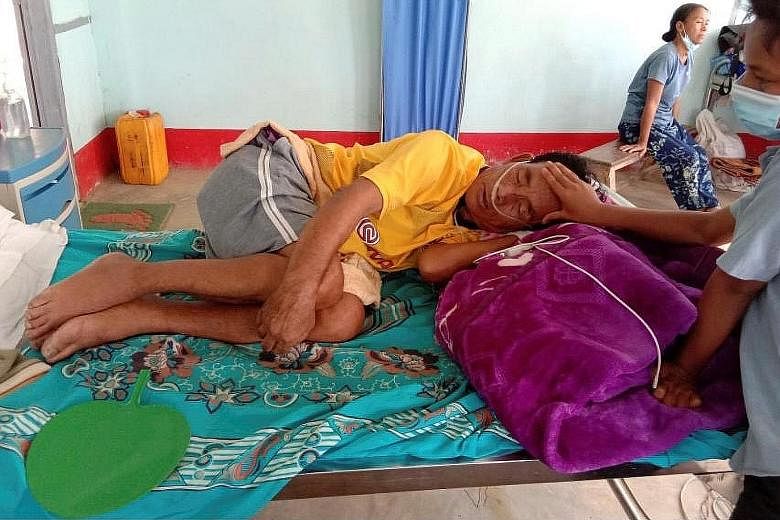YANGON • Mr Hla Min, a rice farmer in central Myanmar, was getting regular radiation therapy for cancer when the military seized power in the Feb 1 coup.
Initially expected to survive, he lasted less than three months. His treatment ended when doctors at Mandalay General Hospital walked off the job to protest against the coup.
Soldiers soon occupied the hospital and others across Myanmar, using them as bases for their bloody crackdown on resistance to the junta's rule. Many medical workers and would-be patients, fearing arrest or worse, stayed away.
Even as his health deteriorated, Mr Hla Min supported the doctors' decision to stop working at state-run facilities, which helped start a general strike that has brought the economy to a near-halt.
"I know I'm dying," he said in an interview in late April. "But I will never blame the doctors, because young people are dying in the streets after being shot by the police and soldiers. Compared to them, my death will be nothing."
He died a week later, at 46.
Since the coup, more than 860 people are believed to have been killed by the security forces, who have gunned down protesters, bystanders and even young children.
But health experts say the breakdown of Myanmar's public healthcare system is taking a greater toll.
Hundreds of lives are lost each week because emergency surgery is not being performed, doctors say. Disease prevention programmes have halted, including a child vaccination campaign.
Many physicians who refuse to work for the regime are treating patients at private hospitals or underground clinics, but those facilities cannot provide the specialised care that major public hospitals like Mandalay General can.
"I know there are hundreds of people dying per week," said Dr Kyaw Moe, one of the striking Mandalay General surgeons, who now sees patients at a private clinic.
"Of course, I feel sorry and very sad for that, but the most important thing for our country is to bring down the military. If not, our future generations and our country will die."
The crisis, which a United Nations official has called a "health emergency", comes at a potentially critical moment in the Covid-19 pandemic for Myanmar.
There are reports of significant outbreaks in towns near the border with India, where a new variant has raged, but testing and vaccinations in Myanmar have nearly stopped.
Experts fear the coronavirus could spread undetected and overwhelm understaffed hospitals and clinics in the coming months.
Doctors, who are highly respected in Myanmar, were among the early leaders of the civil disobedience movement, which has virtually shut down the economy in an effort to force the regime from power. The first protest against the generals, three days after the coup, was led by a doctor, Dr Tayzar San, in the city of Mandalay. The junta has issued a warrant for his arrest.
In February, as the security forces began shooting protesters in large numbers, volunteer doctors, nurses and students organised to treat the wounded.
The World Health Organisation has reported a dramatic surge in attacks on healthcare personnel and facilities in Myanmar this year, resulting in 14 deaths, though its published statistics provide few details.
Some doctors and medical students have joined a fledgling armed resistance to the military.
Soldiers have been stationed at more than 50 hospitals and other healthcare centres at various times since the coup, according to the UN. Their presence has deterred many people from seeking care.
Some said they feared being shot if they approached a hospital. Others said they would rather die than get treatment or a Covid-19 vaccine at a hospital under army control.
Mandalay General, a 1,500-bed university teaching hospital with dozens of specialised departments, had more than 200 doctors before the coup. In April, there were just 20, according to a surgeon who returned to work there after walking out in February.
A spokesman for the Health Ministry, Dr Khin Khin Gyi, said that soldiers maintained a minimal presence at medical facilities and were there to provide security.
She also said that more than half the healthcare workers who had walked out were back on the job. Striking doctors disputed that, saying that fewer than one-quarter had returned to work.
NYTIMES

